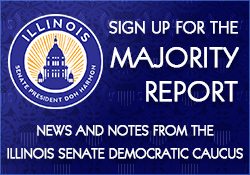 SPRINGFIELD – The first Juneteenth, or “Freedom Day,” on June 19, 1865 marked a delayed but powerful step toward freedom, and the beginning of a new, ongoing struggle for justice, equity and full citizenship for enslaved African Americans. This year, members of the Illinois Senate Democratic Caucus are building on previous years’ of advocacy and momentum by encouraging people to celebrate Juneteenth and reminding them of the reason for the holiday.
SPRINGFIELD – The first Juneteenth, or “Freedom Day,” on June 19, 1865 marked a delayed but powerful step toward freedom, and the beginning of a new, ongoing struggle for justice, equity and full citizenship for enslaved African Americans. This year, members of the Illinois Senate Democratic Caucus are building on previous years’ of advocacy and momentum by encouraging people to celebrate Juneteenth and reminding them of the reason for the holiday.
“Juneteenth is more than a commemoration of freedom for African Americans,” said State Senator Willie Preston (D-Chicago), chair of the Illinois Legislative Black Caucus. “This holiday serves as a symbol of resilience and resistance, showcasing the perseverance and strength of African Americans in the face of adversity. I encourage residents to use this time to celebrate the culture, and remember the history, of Black Americans.”
In 1863, President Abraham Lincoln issued the Emancipation Proclamation, which established that all enslaved people in Confederate states were forever free. However, it was not until two years later in June of 1865 that federal troops arrived in Galveston, Texas to enforce the proclamation freeing the last of slaves in the United States.
In 2021, Senate Majority Leader Kimberly A. Lightford championed House Bill 3922, which established June 19 as a state holiday for Juneteenth National Freedom Day. It is now recognized as a holiday on both the state and federal levels.
Today, Juneteenth is not just a day of remembrance – it’s part of a long, unbroken line of moments where African Americans have demanded full participation in American democracy and insisted on preserving their history and culture despite efforts to erase or ignore it.
“The struggle for our people to achieve full equity in Illinois and across the nation continues still to this day,” said Lightford (D-Maywood). “Juneteenth recognizes our accomplishments, our achievements, our culture, and reminds us that our fight is not over.”
Preston and Lightford hope residents honor Juneteenth by learning the deeper truths of American history, celebrating Black culture and achievement, and committing to preserving and uplifting Black voices.












 © 2025 Illinois Senate Democratic Caucus
© 2025 Illinois Senate Democratic Caucus